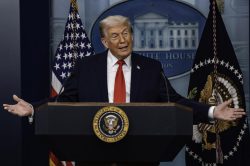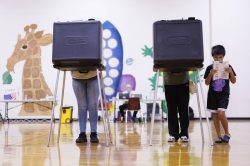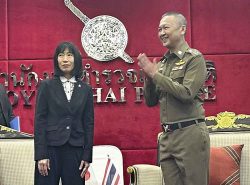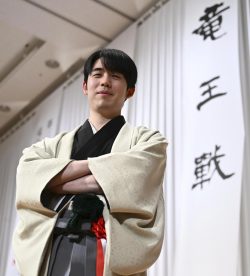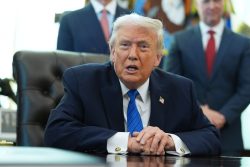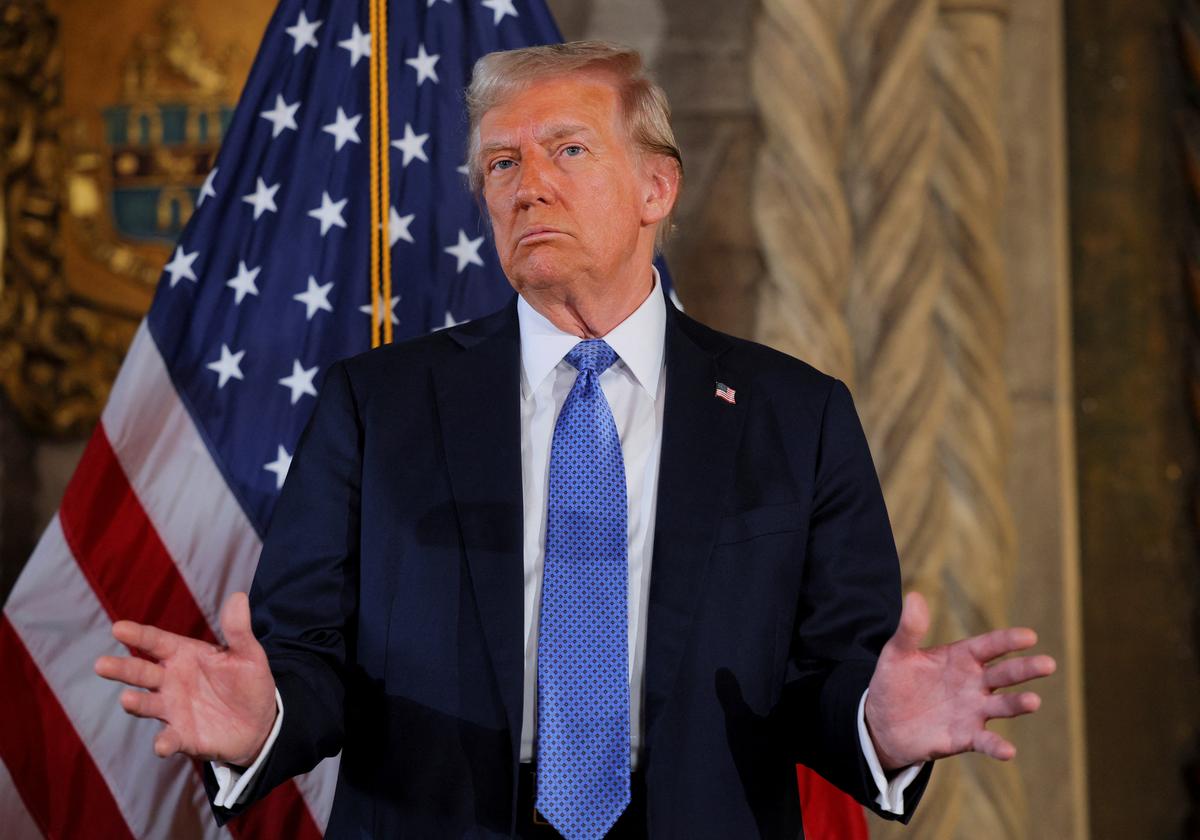
U.S. President-elect Donald Trump delivers remarks at Mar-a-Lago in Palm Beach, Florida, U.S., December 16, 2024.
13:10 JST, December 17, 2024
PALM BEACH, Fla. – President-elect Donald Trump, in a sweeping 70-minute news conference from his Florida home, signaled an abrupt shift from the Biden presidency in both substance and style, threatening to fire federal workers who do not return to the office and confirming that he is “looking at” privatizing the U.S. Postal Service.
Five weeks before Inauguration Day, Trump publicly embraced his role as president-in-waiting, musing about issuing a pardon for New York’s Democratic mayor and expressing skepticism about his daughter-in-law’s chances of being appointed to replace Marco Rubio (R-Florida) in the Senate.
Trump also signaled that some Republican senators could face primary challenges for opposing his Cabinet picks if they were “unreasonable.” Overall, the president-elect signaled far greater comfort with the prospect of assuming power than he did eight years ago, boasting of the parade of business executives and foreign leaders who have visited him and bragging that he has already made progress on some of his goals.
Trump waded into the battle over some of his more controversial Cabinet picks, predicting that Robert F. Kennedy Jr., his selection for health secretary, would be “much less radical than you would think.” Trump called himself a “big believer” in the polio vaccine – a pointed reference to reports that an ally of Kennedy once petitioned the government to reconsider its approval of the vaccine.
Trump said that his choice for defense secretary, Pete Hegseth, “gave up a lot” in agreeing to the role, given his high-profile position as a Fox News host. “He was going big places in Fox – big, big places, a lot of money – and he didn’t even hesitate,” Trump said. “He was doing great; they have the number one show that Saturday and Sunday. … If this didn’t work out for him, it would be actually sort of tragic.”
When asked whether Republican senators should be challenged in GOP primaries if they don’t support his Cabinet picks, Trump replied: “If they’re unreasonable.”
“If they’re opposing somebody for political reasons or stupid reasons, I would say it has nothing to do with me, I would say they probably would be primaried,” he said. “But if they’re reasonable, fair and really disagree with something or somebody I could see that happening.”
It is not unusual for presidents-elect to appear before the press to introduce their selections for top administration posts or preview their policy agendas. Trump had done little of that before Monday, but his appearance at Mar-a-Lago nevertheless highlighted how much public attention has shifted to his plans as President Joe Biden has stepped out of the limelight.
Biden appeared at the Labor Department on Monday to be inducted into the agency’s hall of honor, and he will travel to Wilmington, Delaware, this week to commemorate the anniversary of the death of his wife and daughter in 1972. Biden last held a formal solo news conference in the summer, at the end of a NATO summit.
Eight years ago, Trump’s transition was marked by shake-ups and infighting, in part because his victory was a surprise even to many in his own camp. This time, he has seemed less eager for the spotlight. Trump has rarely spoken in public since he won the Nov. 5 election, and Monday’s appearance was his first news conference as president-elect.
At the same time, Trump has moved more quickly than he did eight years ago to prepare to seize the levers of power, naming allies to pivotal administration posts and welcoming an array of high-profile visitors to his Mar-a-Lago home.
In 2016, foreign and business leaders also sought to meet and speak with Trump. But Trump, who has traded the public glamour of the Trump Tower lobby in New York for more secluded meetings at his Palm Beach estate, expressed confidence that more people are on his side this time.
“One of the big differences between the first term – in the first term everybody was fighting me,” he said. “In this term, everybody wants to be my friend.”
Trump called the news conference at his Mar-a-Lago estate to announce a major U.S. investment by the Japanese company SoftBank. He bragged that CEO Masayoshi Son – standing beside him – felt “very optimistic about our country since the election.” But Son’s pledge echoed a $50 billion promise eight years ago that yielded mixed results.
The SoftBank announcement was followed by a 45-minute back-and-forth with reporters in which Trump revisited some of the greatest hits from his campaign rallies, making familiar calls for tougher border restrictions and exaggerated claims about undocumented immigration.
As he had throughout the campaign, Trump harshly criticized Biden’s policies and proclaimed his intent to take a dramatically different approach.
He criticized the recent move by outgoing Biden administration political appointees at the Social Security Administration to allow thousands of employees to continue working from home through 2029, for example. Trump said he would go to court to stop the arrangement and vowed that “if people don’t come back to work, come back into the office, they’re going to be dismissed,” previewing a return-to-work mandate he hopes to issue to much of the 2.3 million-person federal workforce early next year.
But the president-elect did not limit his comments to criticisms of Biden. He answered questions about TikTok, tariffs, media lawsuits and the killing of UnitedHealthcare CEO Brian Thompson, which Trump called “cold-blooded.” He even weighed in on an infamous, now-retracted rape claim against Duke lacrosse players (“I thought it was a hoax when it happened”) and recent claims of drone sightings over New Jersey, speculating that government officials know the reason for the surge in reports.
“For some reason they want to keep people in suspense,” Trump said, joking that maybe he would not spend the weekend at his New Jersey golf club.
Federal officials have said they are investigating the sightings, but have no evidence of any threat to public safety. White House National Security Council spokesman John Kirby said Monday that the sightings are “a combination of lawful commercial drones, hobbyist drones and law enforcement drones, as well as manned fixed-wing aircraft, helicopters and even stars.”
Trump also tamped down speculation that Florida Gov. Ron DeSantis (R) would appoint the president-elect’s daughter-in-law, Lara Trump, to replace Rubio, who has been chosen as secretary of state, suggesting he did not expect the governor to do so.
“Ron’s going to have to make that decision, and he’ll make the right decision,” Trump said. “I also know that Lara’s got so many other things.”
Trump said he would consider pardoning embattled New York Mayor Eric Adams, who was charged in September with bribery, wire fraud and seeking illegal campaign donations. He alleged that Adams was “treated pretty unfairly” and suggested, without evidence, that the indictment was connected to Adams’s support for immigration restrictions.
Asked about ABC News’s decision to pay millions to settle a defamation lawsuit brought by Trump, the president-elect suggested he might take additional legal action against the news media.
Trump said he planned to file a “major lawsuit” against the Des Moines Register, which published a poll from Ann Selzer days before the election that showed Vice President Kamala Harris leading Trump in Iowa.
“I have to do it. It costs a lot of money to do it,” he said. “But we have to straighten out the press. Our press is very corrupt – almost as corrupt as our elections.”
Although Selzer’s poll diverged significantly from the final result, she has been a highly respected pollster for decades. She has said the poll was conducted to the best of her ability. Trump provided no evidence of wrongdoing by Selzer or the Register.
Trump has a history of threatening lawsuits – against defendants as varied as Sen. Ted Cruz (R-Texas) and an anti-Trump T-shirt company – that he does not ultimately file.
He said he was happy with some of the recent coverage of the executives who have courted him. “The press has covered that fairly, actually, for a change,” he said.
On foreign policy, Trump reiterated his desire to take a sharply different approach than Biden has toward Ukraine and the Middle East. The president-elect blasted Biden’s recent decision to authorize Ukraine to use a long-range American weapon for strikes inside Russia.
“I thought it was a very stupid thing to do,” Trump said, adding that he might reverse the decision.
Trump has been deeply skeptical of U.S. involvement in Ukraine, privately saying he could end the war by pressuring Kyiv to give up some territory, people familiar with the matter previously told The Washington Post.
“It’s a tough one, it’s a nasty one,” Trump said of the war in Ukraine on Monday. He said “it’s got to stop.” He declined to say if he had spoken with Russian President Vladimir Putin since his election – as The Post reported – but said he would be speaking with both Putin and Ukrainian President Volodymyr Zelensky.
He said he did not invite Zelensky to his inauguration, despite reports that he extended offers to other world leaders, including Chinese President Xi Jinping. But if Zelensky wanted to come, Trump said, “I’d like to have him.”
“I spoke to over 100 countries,” Trump remarked. “You wouldn’t believe how many countries there are.”
On the other conflict that has consumed much of the Biden presidency, the war in the Middle East, Trump said his call last weekend with Israeli Prime Minister Benjamin Netanyahu was “very good,” although he did not go into detail.
He appeared to take preemptive credit for a potential ceasefire deal between Israel and Hamas that would include a release of hostages held by the militant group. “You know, I gave warning that if these hostages aren’t back home by that date, all hell’s going to break out,” Trump said, referring to Inauguration Day.
Beyond the substance, the number and variety of Trump’s answers suggested that his second stint in the White House may signal a return to the high-intensity communication style of his first term, when he commented on everything from pop culture to sporting events and would post on social media around-the-clock.
Biden reclaimed the White House while promising that, unlike Trump, Americans would not have to think about him all the time, and he has largely governed that way.
Trump appeared to enjoy the attention on Monday. Even when he briefly stepped away from the microphone to allow his co-transition chair and commerce secretary pick Howard Lutnick to take questions, the president-elect continued to answer them.
Top Articles in News Services
-

Prudential Life Expected to Face Inspection over Fraud
-

Arctic Sees Unprecedented Heat as Climate Impacts Cascade
-

South Korea Prosecutor Seeks Death Penalty for Ex-President Yoon over Martial Law (Update)
-

Trump Names Former Federal Reserve Governor Warsh as the Next Fed Chair, Replacing Powell
-

Suzuki Overtakes Nissan as Japan’s Third‑Largest Automaker in 2025
JN ACCESS RANKING
-

Univ. in Japan, Tokyo-Based Startup to Develop Satellite for Disaster Prevention Measures, Bears
-

JAL, ANA Cancel Flights During 3-day Holiday Weekend due to Blizzard
-

Japan Institute to Use Domestic Commercial Optical Lattice Clock to Set Japan Standard Time
-

China Confirmed to Be Operating Drilling Vessel Near Japan-China Median Line
-

China Eyes Rare Earth Foothold in Malaysia to Maintain Dominance, Counter Japan, U.S.




